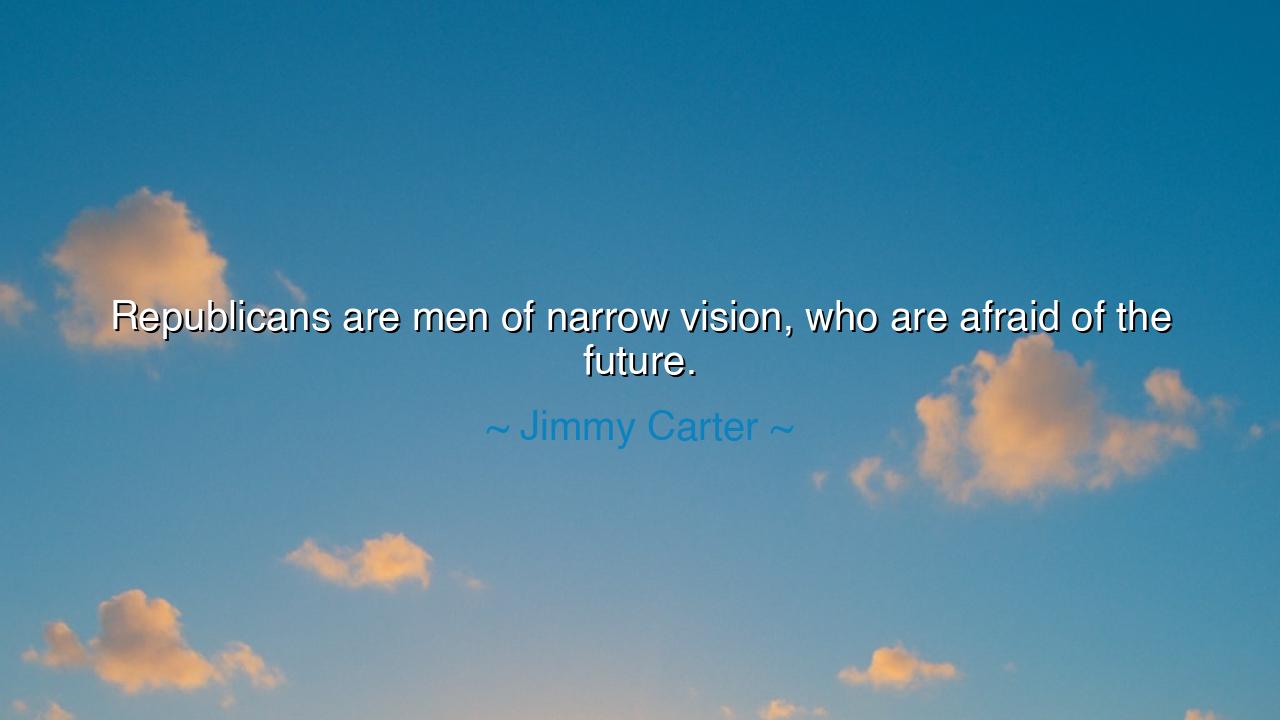
Republicans are men of narrow vision, who are afraid of the






Jimmy Carter's words, “Republicans are men of narrow vision, who are afraid of the future,” cut to the heart of a deeper truth about how fear and narrow-mindedness can limit the potential of individuals and societies. In this powerful statement, Carter speaks to the human tendency to hold on to the known and the familiar, to resist change and growth, particularly when confronted with the unknown terrain of the future. His words reflect a broader critique of those who allow their fears of what might come to blind them to the possibilities that lie ahead. Fear of the future, and a narrow vision, can keep us stuck in the past, unable to move forward and embrace the challenges and opportunities that life presents.
This concept of fear limiting vision is as ancient as civilization itself. The ancient Greeks understood this well. In their philosophy, the greatest obstacles to wisdom and progress were often internal: fear, pride, and complacency. Socrates, for instance, frequently challenged his fellow Athenians to question their assumptions and embrace uncertainty. He believed that wisdom was found not in clinging to past knowledge or comforts, but in the pursuit of truth—which required a willingness to face the unknown with courage and an open mind. In this sense, Carter’s critique of narrow vision and fear of the future mirrors the Socratic call to transcend our limitations and think beyond what we already know.
The history of great leaders is often marked by their ability to embrace the future, to look beyond the horizon and see possibilities where others see only risks. Alexander the Great, for example, did not remain confined to the lands of his ancestors. His vision of an empire stretching from Greece to India was a radical departure from the norm, one that defied the expectations of his time. He was not afraid to confront the unknown—to march into lands where no Greek had ever set foot, to engage in battles with cultures vastly different from his own. His boldness and willingness to embrace change paved the way for his incredible successes. In contrast, a leader who fears the future, as Carter suggests, will be trapped in a small, limited world, unable to act with the courage needed for true greatness.
Consider the case of Winston Churchill, who led Britain through the darkest days of World War II. At a time when the future seemed bleak, with the threat of Nazi domination hanging over Europe, Churchill’s vision was not one of surrender, but of victory—a future where Britain stood resilient and free. He understood that fear of the future could lead to defeat, but courage and hope could transform the present. His speeches, filled with the conviction that the future could be shaped by determination, inspired his people to hold firm and resist. Churchill’s leadership was defined by his ability to look beyond the immediate dangers, to a time when freedom would again reign over Europe. This was a future that could only be realized by embracing the unknown and trusting that action, not fear, would lead the way.
Carter’s criticism of Republicans as those who are “afraid of the future” reflects his belief in the need for visionary leadership—one that does not cling to past ideologies or resist progress for the sake of comfort. It is a call to embrace change with an open heart, to confront the unknown with the belief that progress is the only way forward. History teaches us that those who fear the future often cling to outdated systems, preventing the necessary transformations that allow societies to flourish. Just as the Roman Empire fell due to its inability to adapt to new challenges, so too can modern societies stagnate if they refuse to embrace the future with courage and foresight.
The lesson here is both timeless and urgent: fear of change and a narrow view of the world can prevent us from realizing our true potential. To grow, to evolve, to lead, we must learn to embrace the future, not with anxiety, but with the vision and courage that have always characterized the greatest figures in history. Every moment offers us the opportunity to shape the future—not through fear, but through bold action. The lesson for each of us is this: we must look beyond the familiar comforts of the present and step forward into the unknown with the conviction that the future can be shaped by our courage, our decisions, and our willingness to adapt.
In practical terms, this means that we must cultivate a mindset that is not afraid of the challenges and uncertainties ahead. We must learn to act boldly in the face of change, rethink old assumptions, and be willing to engage with the future as it comes, not as a threat, but as an opportunity. Whether in leadership, innovation, or personal growth, we must break free from the fear of the unknown and embrace the future with the same courage that those who came before us demonstrated in their struggles. Let us rise to meet the future, knowing that it is not our fears, but our actions, that will define the path ahead.






AAdministratorAdministrator
Welcome, honored guests. Please leave a comment, we will respond soon